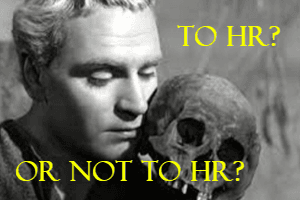In the November 26, 2019 Ask The Headhunter Newsletter a reader questions the value of a credit report when judging a job applicant.
Question
Is a credit report from the big three credit reporting agencies (e.g., Experian) a good proxy for determining if a job candidate would be a security risk? Should a candidate be given the opportunity to explain and provide background about any items on a credit report that may appear as a negative to a potential employer? Or, should the credit check stand as a pass/fail test that a potential employer uses to determine if a candidate might be a security risk?
Nick’s Reply
You’re not asking how to avoid getting rejected for a job because of your credit report, but whether I think this would be justified or wise on the part of employers. We’ll stick to the topic here. If there’s enough interest, we can tackle the “how to” another time.
While we might make a case for employers doing credit checks on job applicants, it makes no sense to me why employers rely on such information to judge whether an applicant might be a security risk — especially not on a pass/fail basis. I haven’t seen any statistics on the actual correlation, much less any suggestion that credit records predict security worthiness. (If someone’s got statistics, please share in the comments section below.) The real risk to the employer is that it loses an otherwise excellent candidate to an assumption that credit behavior correlates with job performance and security worthiness.
Does a bad credit report make you a bad hire?
It might seem silly to make the comparison, but do we reject applicants who’ve been divorced because they are more likely to be bad business partners? Do we reject software developers because they don’t do proper maintenance on their cars? What about people with disabilities? Are they risky hires? Oops. The law protects them. Do you see where I’m going? I think employers should stick first to judgments about whether a candidate can do the job effectively, and second whether they fit the social norms of the organization.
Employers need to teach hiring managers how to make better assessments and judgments of candidates directly and personally. It’s an interview skill. But how many companies teach interview skills?
Is your credit report a valid and reliable metric?
I agree that, if a credit check is to be done, the applicant should be allowed to explain the report – but that opens another legal can of worms. The applicant could potentially sue the employer for rejection based on misinterpreting the information. This, of course, is why the employer might use a credit report as a pass/fail metric without disclosing it to you. (For more about this, read my good buddy Suzanne Lucas’s warning to employers, If You Run Credit Checks on Your Job Candidates, Now Would Be A Good Time To Panic.)
Is there any defensible reason for basing a hiring decision on such a data point? It’s hard to make the case that it’s valid except as an indication of credit worthiness (and even that can be questionable). It’s worth looking up “validity” and “reliability” in the context of making assessments. Does a credit check really measure what you need to measure?
Employers have explaining to do
Here’s how I think I prove my point. I’ve never heard of an employee being terminated because the employer checked their credit report. If credit checks are such valid and reliable indicators of security worthiness (or any other job-related requirement), why don’t employers run reports on all employees annually to decide whom to terminate? I think HR has a lot of explaining to do.
Employers try too hard to offload candidate assessment to indirect metrics, and they do a lousy job of justifying themselves. In most companies, it seems HR’s first objective is to offload liability. I think the better practice is for employers to make their interviewing and reference checking more rigorous. To avoid unreasonable risk, make managers very good at interviewing and judging job applicants.
My snarky suggestion to job seekers is to ask a snarky but justified question if an employer brings up a credit check. “Can you show me empirical evidence that my credit report is a valid and reliable metric for judging me as a worthy hire?”
You’d be surprised how many successful people I’ve placed who had questionable “background checks.” It takes a lot more to really judge someone – or you miss some great candidates!
Have you missed out on a good job (or a good job applicant) over a credit check? Have you outwitted a negative credit report when applying for a job? Do you believe credit checks tell employers anything useful about a person? Is someone’s credit report a worthy pass/fail test for hiring?
: :




 I am writing a letter of recommendation for a co-worker who is interviewing for a new job. It’s sort of a quid pro quo situation. Both he and I are somewhat unsure of how to write one, especially when doing it for a co-worker.
I am writing a letter of recommendation for a co-worker who is interviewing for a new job. It’s sort of a quid pro quo situation. Both he and I are somewhat unsure of how to write one, especially when doing it for a co-worker.




 What are you afraid of when job hunting?
What are you afraid of when job hunting?


 I am planning to quit my job, but my boss said to hold off on quitting until we can at least hire my replacement. Otherwise, he said, “I will make things very, very bad for you.” How should I respond to this?
I am planning to quit my job, but my boss said to hold off on quitting until we can at least hire my replacement. Otherwise, he said, “I will make things very, very bad for you.” How should I respond to this?
 Can we charge new hires a penalty when they quit and leave us short-staffed? Can an employer state in an employment contract that if the new hire does not stay for a certain number of days, we retain the right to withhold $X to reimburse us for the time we spent training them? This Generation X and their job-hopping is costing this hospital tens of thousands and we are trying to find ways to teach them – work or lose money. Use us – lose money. We’re having a tough time with it. I did research. You came up.
Can we charge new hires a penalty when they quit and leave us short-staffed? Can an employer state in an employment contract that if the new hire does not stay for a certain number of days, we retain the right to withhold $X to reimburse us for the time we spent training them? This Generation X and their job-hopping is costing this hospital tens of thousands and we are trying to find ways to teach them – work or lose money. Use us – lose money. We’re having a tough time with it. I did research. You came up.
 I am starting a company. I have an absolute disdain for HR as a general rule and wanted to get your thoughts on a company running without an HR department.
I am starting a company. I have an absolute disdain for HR as a general rule and wanted to get your thoughts on a company running without an HR department. 
